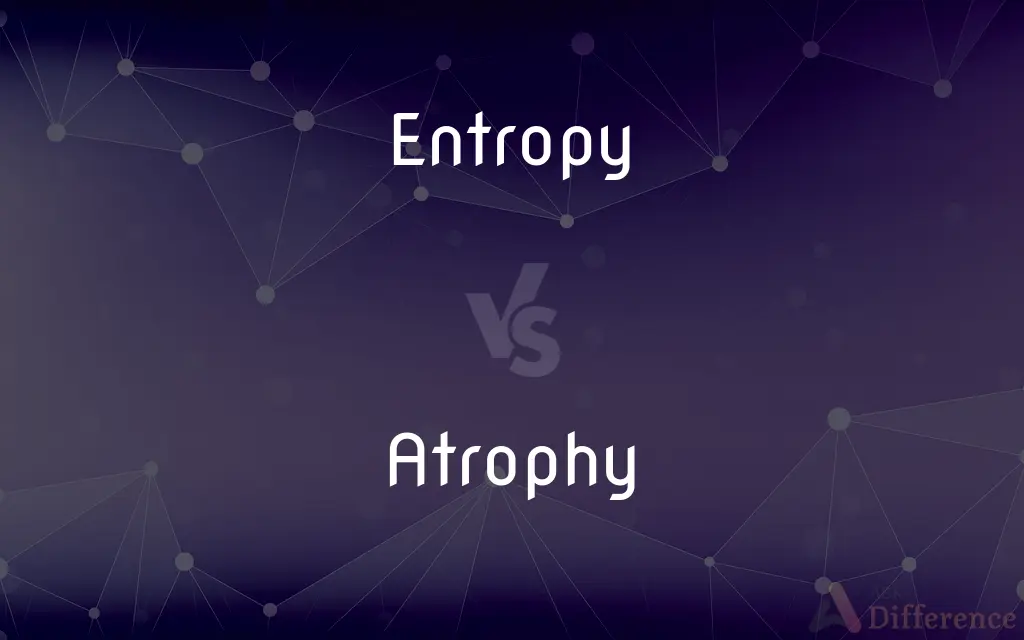Entropy vs. Atrophy — What's the Difference?
By Urooj Arif & Fiza Rafique — Updated on March 14, 2024
Entropy measures disorder, while atrophy signifies decline or waste.

Difference Between Entropy and Atrophy
Table of Contents
ADVERTISEMENT
Key Differences
Entropy, in a thermodynamic sense, is a measure of disorder or randomness in a system, often associated with the second law of thermodynamics which states that entropy within an isolated system always increases over time. This concept is widely applied in physics, chemistry, and information theory to describe the gradual decline into disorder. Whereas, atrophy refers to the reduction in size or wasting away of an organ or tissue due to various causes, such as lack of use, disease, or malnutrition, primarily used in biological and medical contexts.
While entropy is a broader concept that can be applied to various fields to describe the transition from order to disorder, atrophy is specifically concerned with the degeneration or deterioration of cells, tissues, organs, or muscles. Entropy is about the overall state of disorder in a system, on the other hand, atrophy describes a decrease in effectiveness or strength in a specific part of a living organism.
Entropy is often used metaphorically to describe the breakdown or decline of systems beyond physical and chemical processes, such as in social systems, communication, and information transfer. Atrophy, however, is used more literally to describe a physical reduction or degeneration, rarely applied metaphorically.
The increase in entropy is a fundamental natural process, indicating the irreversible nature of physical and chemical changes leading to increased disorder. Atrophy, on the other hand, can sometimes be reversible or preventable through interventions such as physical therapy, nutritional support, or medical treatment, depending on its cause.
Entropy represents a universal principle of increasing disorder in a system, while atrophy describes a specific, often localized, decline or reduction in size or function, primarily in biological contexts.
ADVERTISEMENT
Comparison Chart
Definition
Measure of disorder or randomness in a system
Reduction in size or wasting away of an organ or tissue
Context
Physics, chemistry, information theory
Biology, medicine
Scope
Broad, applicable to various fields
Specific, related to biological decline
Metaphorical Use
Often used metaphorically
Rarely used metaphorically
Reversibility
Fundamental and irreversible increase
Potentially reversible with intervention
Compare with Definitions
Entropy
In information theory, the measure of uncertainty or randomness.
The entropy in the message increased due to the noise in the transmission.
Atrophy
The wasting away of tissues, organs, or muscle.
The patient's muscles showed signs of atrophy from disuse.
Entropy
The natural tendency towards disorder.
Entropy explains why it's easier for things to become disorganized over time.
Atrophy
The decrease in size or wasting of an organ due to disease or lack of use.
After being in a cast for months, her leg muscle atrophy was evident.
Entropy
A measure of disorder in a system.
The entropy of the room increased as papers and objects were scattered around.
Atrophy
A reduction in effectiveness or size due to neglect or undernourishment.
The unused garden suffered atrophy, becoming overgrown and barren.
Entropy
The principle that disorder increases over time in an isolated system.
The second law of thermodynamics is often illustrated by the concept of entropy.
Atrophy
The decline in strength or ability due to aging or disease.
Age-related atrophy affected his ability to perform tasks that were once easy.
Entropy
A concept in thermodynamics related to energy dispersal.
The process resulted in increased entropy, indicating a loss of usable energy.
Atrophy
The process of something diminishing in size because of adverse conditions.
The prolonged drought led to the atrophy of the crop yields.
Entropy
Entropy is a scientific concept, as well as a measurable physical property that is most commonly associated with a state of disorder, randomness, or uncertainty. The term and the concept are used in diverse fields, from classical thermodynamics, where it was first recognized, to the microscopic description of nature in statistical physics, and to the principles of information theory.
Atrophy
Atrophy is the partial or complete wasting away of a part of the body. Causes of atrophy include mutations (which can destroy the gene to build up the organ), poor nourishment, poor circulation, loss of hormonal support, loss of nerve supply to the target organ, excessive amount of apoptosis of cells, and disuse or lack of exercise or disease intrinsic to the tissue itself.
Entropy
Symbol S For a closed thermodynamic system, a quantitative measure of the amount of thermal energy not available to do work.
Atrophy
A wasting or decrease in size of a body organ, tissue, or part owing to disease, injury, or lack of use
Muscular atrophy of a person affected with paralysis.
Entropy
A measure of the disorder or randomness in a closed system.
Atrophy
A wasting away, deterioration, or diminution
Intellectual atrophy.
Entropy
A measure of the loss of information in a transmitted message.
Atrophy
To cause to wither or deteriorate; affect with atrophy.
Entropy
The tendency for all matter and energy in the universe to evolve toward a state of inert uniformity.
Atrophy
To waste away; wither or deteriorate.
Entropy
The deterioration of a system or society, especially when it seems inevitable
City activists who fought entropy by organizing neighborhood groups.
Atrophy
(pathology) A reduction in the functionality of an organ caused by disease, injury or lack of use.
Entropy
A measure of the disorder present in a system.
Atrophy
(intransitive) To wither or waste away.
Entropy
(Boltzmann definition) A measure of the disorder directly proportional to the natural logarithm of the number of microstates yielding an equivalent thermodynamic macrostate.
Atrophy
(transitive) To cause to waste away or become abortive; to starve or weaken.
Entropy
(information theory) Shannon entropy
Atrophy
A wasting away from lack of nourishment; diminution in bulk or slow emaciation of the body or of any part.
Entropy
A measure of the amount of energy in a physical system that cannot be used to do work.
Atrophy
To cause to waste away or become abortive; to starve or weaken.
Entropy
The capacity factor for thermal energy that is hidden with respect to temperature.
Atrophy
To waste away; to dwindle.
Entropy
The dispersal of energy; how much energy is spread out in a process, or how widely spread out it becomes, at a specific temperature.
Atrophy
A decrease in size of an organ caused by disease or disuse
Entropy
A measure of the amount of information and noise present in a signal.
Atrophy
Any weakening or degeneration (especially through lack of use)
Entropy
(uncountable) The tendency of a system that is left to itself to descend into chaos.
Atrophy
Undergo atrophy;
Muscles that are not used will atrophy
Entropy
A certain property of a body, expressed as a measurable quantity, such that when there is no communication of heat the quantity remains constant, but when heat enters or leaves the body the quantity increases or diminishes. If a small amount, h, of heat enters the body when its temperature is t in the thermodynamic scale the entropy of the body is increased by h ÷ t. The entropy is regarded as measured from some standard temperature and pressure. Sometimes called the thermodynamic function.
The entropy of the universe tends towards a maximum.
Entropy
(communication theory) a numerical measure of the uncertainty of an outcome;
The signal contained thousands of bits of information
Entropy
(thermodynamics) a thermodynamic quantity representing the amount of energy in a system that is no longer available for doing mechanical work;
Entropy increases as matter and energy in the universe degrade to an ultimate state of inert uniformity
Common Curiosities
What is atrophy?
Atrophy refers to the reduction in size or wasting away of an organ, tissue, or muscle, often due to lack of use or disease.
Can entropy be reversed?
In an isolated system, the second law of thermodynamics states that entropy cannot decrease, making the process irreversible.
Is atrophy always permanent?
Not necessarily. Some forms of atrophy, such as those due to disuse, can be reversed with physical therapy or increased activity.
What is entropy?
Entropy is a measure of disorder, randomness, or uncertainty in a system.
Can atrophy affect non-biological systems?
Atrophy is primarily used to describe biological phenomena, though metaphorically, it can describe the decline of non-biological entities.
How do entropy and atrophy relate to aging?
Aging can be associated with both concepts: entropy as a metaphor for the increase in disorder and atrophy in the physical decline of tissues and organs.
Is increasing entropy a bad thing?
Entropy is a natural process. While it often denotes disorder or energy dispersal, it's not inherently "bad" but a fundamental aspect of physical laws.
How does entropy apply outside of physical sciences?
Entropy is used metaphorically to describe the breakdown or decline of systems in fields such as information theory, social sciences, and more.
What causes atrophy?
Atrophy can be caused by disuse, malnutrition, disease, injury, or aging.
Can entropy be measured?
Yes, in physical and chemical processes, entropy can be quantitatively measured using statistical mechanics and thermodynamics.
How is atrophy detected?
Atrophy is often detected through physical examination, imaging studies like MRI or CT scans, and measuring the function and strength of the affected area.
Does entropy have practical applications?
Yes, entropy has practical applications in various fields, including thermodynamics, information theory, and even in understanding economic and social systems.
What are the implications of atrophy in medicine?
Atrophy can indicate underlying health issues or the need for medical intervention to prevent further decline or to rehabilitate the affected area.
Can lifestyle choices affect entropy and atrophy?
Lifestyle choices can't affect the fundamental principles of entropy but can influence biological atrophy, such as through exercise or nutrition.
What is the significance of understanding entropy and atrophy?
Understanding these concepts helps in grasping fundamental natural processes, and in the case of atrophy, it can guide medical and lifestyle decisions to maintain health.
Share Your Discovery

Previous Comparison
Grind vs. Ground
Next Comparison
Haze vs. SmokeAuthor Spotlight
Written by
Urooj ArifUrooj is a skilled content writer at Ask Difference, known for her exceptional ability to simplify complex topics into engaging and informative content. With a passion for research and a flair for clear, concise writing, she consistently delivers articles that resonate with our diverse audience.
Co-written by
Fiza RafiqueFiza Rafique is a skilled content writer at AskDifference.com, where she meticulously refines and enhances written pieces. Drawing from her vast editorial expertise, Fiza ensures clarity, accuracy, and precision in every article. Passionate about language, she continually seeks to elevate the quality of content for readers worldwide.
















































